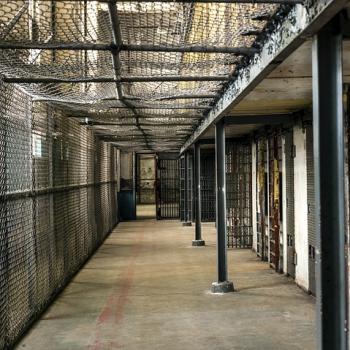It’s an hour where you’re supposed to be fasting. You can’t grab a cracker or a glass of juice if you get low blood sugar. You can’t take your emergency medicine that needs to be washed down with milk to prevent ulcers. You’re supposed to be still and attentive; you can’t pace around to keep your legs from going numb. You can’t talk to yourself to keep yourself awake. You can’t tap your fingers or play with your cats or your fidget spinner or however you keep yourself from dissociating.
It’s an hour with a lot of loud noise and visual stimulation, not to mention someone swinging a thurible for the express purpose of making smelly smoke.
It’s an hour surrounded by total strangers who don’t know what you’re going through. Strangers who are often bored, so they’ll stare at you without meaning to if you act in any way that distracts them– which means if you’ve got PTSD or bad social anxiety, they just might trigger a flashback or a panic attack and make you unwell for days. They might be wearing perfume that causes you migraines. Their children might be carrying germs from school that will wreak havoc on your compromised immune system. They might see you getting dizzy or dozing off and gossip to the rest of the congregation later, and then you’ll have to deal with rumors and people giving you dirty looks. They might see that you sometimes have a wheelchair, sometimes just a cane and sometimes nothing, and decide you’re faking your disability for attention. They just might lean over the pew or back you into a corner at the doughnut social and give you a piece of their minds.
I’m not knocking the liturgy for being what it is. The liturgy is supposed to be well attended by all kinds of people who are different from one another; that’s one of the wonderful things about it. The liturgy ought to engage all of our senses to help us be attentive. We ought to lay aside earthly cares, deny ourselves and try our best to concentrate on prayer. But that doesn’t make it easier for people who are chronically ill or disabled to get through a jam-packed, formal hour full of sensory stimulation in a room full of strangers.
The fact is, a lot of the time, people with chronic illness are going to be too sick to be able to be at Mass on Sunday– even if they’re not the sickest they’ve ever been, even if their sickness is invisible and they “don’t look sick,” even if they’re able to get out of the house to do something else during the week.
For me, it often comes down to timing. There are quite a few days where I have a three-hour window in the middle of the afternoon where I have near normal energy, but am bedbound in the mornings and evenings. Sometimes I’m going to be able to go to the grocery store on Friday, at three o’clock when my energy is at its highest, in my comfortable leggings, walking through it gently at my own pace and using the shopping cart as a walker, but I’m not going to be able to go to Divine Liturgy in my church clothes at ten o’clock Sunday. That doesn’t mean I love groceries more than Jesus. It means I have a chronic illness.
Chronically ill people do not need to give themselves a hard time about missing Mass, or about any accommodations we might need. No acceptance of guilt and no defending ourselves either. If you think you can get through Mass as long as you’re able to excuse yourself to go to the bathroom several times, you should go to Mass, find an aisle seat near the door, and not feel the need to apologize to anybody who glares at you when you get up. If you think you can get through Mass as long as you take your walker, you should take it and not think you owe an explanation to the person who saw you at the library without it earlier in the week. Same with your emergency meds, a water bottle or a cushion for your back. Maybe you need to go to the very quick Novus Ordo Mass with no music or incense at five-thirty on a Saturday and let go of the guilt for not attending the Extraordinary Form liturgy the next day. None of those things are wrong. You got to the Liturgy, and that’s wonderful, the most beautiful thing you could do all week long.
You do not owe an explanation to anyone who leans over the pew to admonish you or corners you at the doughnut social to ask questions or ream you out. You can give them any information you want to give or none at all. You can tell them, charitably but firmly, that they should mind their own business. You can just pretend they’re not there. Your choice. You don’t owe anyone an explanation for showing up to worship God in the body God gave you.
But, If you think you’re too sick to go to Mass at all, you should stay home and not have any guilt about the matter. Christ will supply for your weakness and come find you. You job is to unite your suffering to Him and rest today. The whole Church will benefit from your patient endurance. If somebody from church sees you out and about later and grills you on it, you have no obligation to defend yourself anymore than you have the obligation to go to church when you’re sick.
As I’ve said before on this blog: you are a beloved child of God. Relax. The Sabbath was made for man and not the reverse.
It’s okay to stay home from Liturgy when you’re sick– including when sickness is your normal everyday state.
(image via Pixabay)












